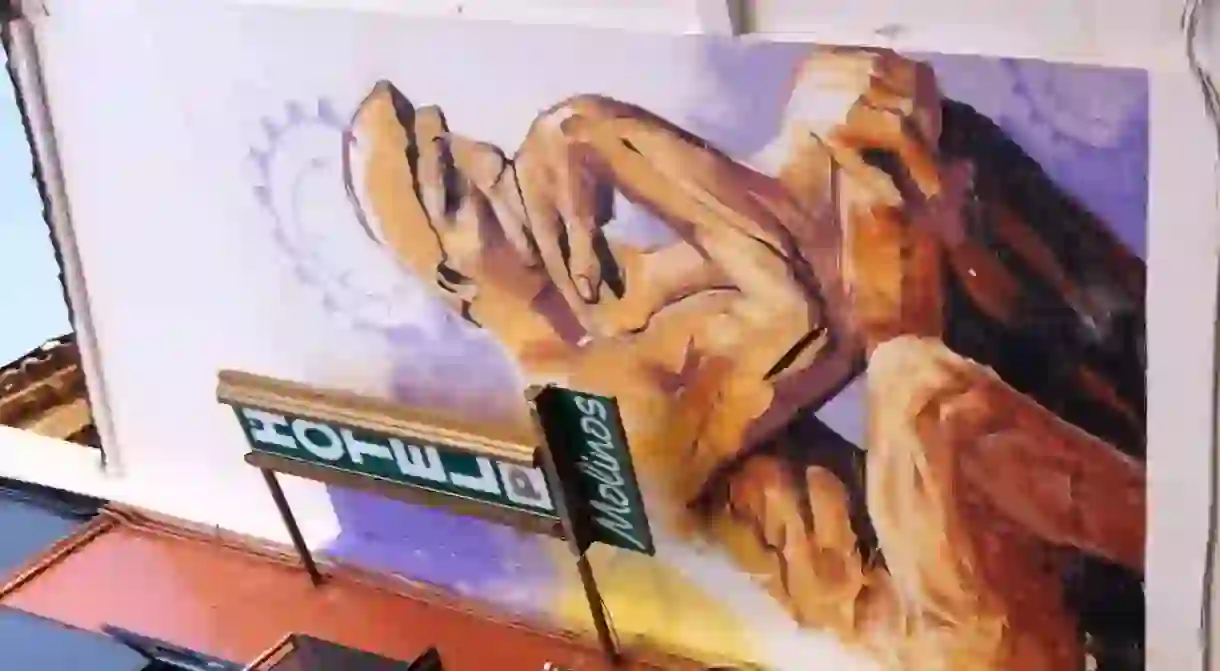The Best Street Art in Granada

Art lovers will find plenty of galleries and museums in Granada, but some of the best works can be found elsewhere. Thanks to the graffiti artist Raul Ruiz, aka El Nino, otherwise ordinary walls in this Spanish city have been turned into bona fide masterpieces.
Some of Granada’s most inventive and original art is not to be found in the city’s many galleries and museums. Rather, it surprises you on street corners, building facades and dilapidated walls all over the city, most notably in what was once Granada’s prosperous Jewish quarter, Realejo.
These edgy, spraypainted murals have elevated graffiti to the status of important art and are the work of Raul Ruiz, aka ‘El Nino de las Pinturas’ (‘The Kid of the Pictures’). You can find a map of their locations on El Nino’s website, but it’s far more fun to simply head over to Realejo and seek them out; that way, you always feel as if you’re the first to stumble on these inspirational pictures. Here are some of El Nino’s most moving and eye-catching works in Realejo.
A priceless amount of street-credit has been conferred on those bars, shops and restaurants in Granada lucky enough to be close to an El Nino work. Here, his portrayal of journies both beginning and ending adorns the otherwise unloved outer wall of a local café.

In contrast to graffiti we consider an eyesore, vandalism that blights the street, El Nino’s work often complements and enhances its surroundings. The shutter-facade of Pupa Tattoo Art Gallery in Realejo is a stunning example of this, El Nino’s design fitting perfectly with the purple building next to it.

Some of El Nino’s works are inspired by classics, such as his take on Auguste Rodin‘s ‘The Thinker’. One of his greatest works, this huge image demonstrates his peerless technique with the spraypaint can. Indeed, on first look, it takes some believing that the muscles and body contours have not been rendered by brushstrokes. You would normally pay to see something of this importance and quality in a gallery, not find it as a backdrop to a horribly outdated hotel sign.

On the same street as Rodin-modernised is another, rather more abstract image. Here, the artist has enhanced his work’s physical context, with the light- and dark-blue background enlivening a facade otherwise dominated by drab brickwork.

As a kind of finale to the street on which all of the above works are situated is one of El Nino’s most eye-catching and wonderfully unhinged collages. It’s made up of three principal images: an apparently angry but very colourful owl, a woman in Arabic headwear in meditation or prayer and a pianist mid-performance. These are connected by stained-glass type patterning, random bubbles and what appear to be half-finished doodles and sketches, one of a child sleeping.

Perhaps in no other El Nino work is his fertile, limitless imagination more in evidence – an imagination that has transformed many of Realejo’s tattered building facades into some of Granada’s most important cultural spaces. After a walk around the neighbourhood that is this artist’s home, as well as his exhibition hall, the concept of graffiti will never mean the same to you again.














